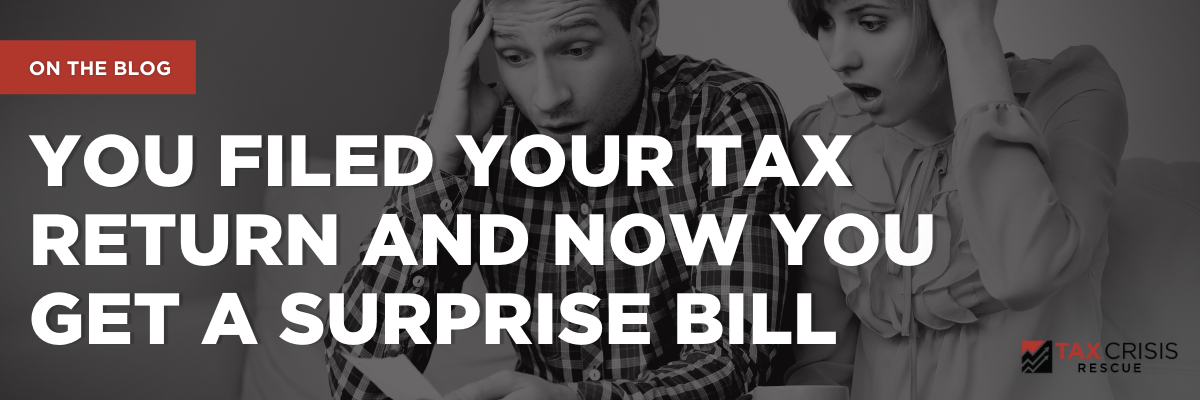After all the effort you put into getting your tax return complete and filed on time, you find out that now you owe a huge amount of tax. We see it often, and we know it feels like a kick in the gut!
So, how do you avoid a similar situation in the future? Although next year’s return may seem like a distant concern for future you, the sooner you are able to act, the easier it will be to avoid another surprise bill next year. How so?
The tax structure in our country is a pay-as-you-go system. What does that mean? This means that as you earn income, the tax must be paid; and, if not paid timely and properly, you can expect to be hit with a hefty penalty – underpayment of estimated tax – on top of the tax bill. If you’ve followed along on social media, you know the best course of action is one that mitigates those nasty penalties.
Tax bills and penalties, these are two separate issues that should be delt with sooner than later. One is the underpayment of tax owed which results in a surprise tax bill. The other is accurately paying the tax as you go to avoid an underpayment penalty.
Avoid Tax Penalties
Avoiding the penalty is straightforward—just meet one of the two following conditions:
- Owe less than $1,000 when you file the return – excludes filing extensions -and payment must be made by April 15.
- Properly pay at least 90% of the tax shown on the return OR 100% of the tax shown on the prior year return, whichever amount is lowest. Substitute 110% for 100% if you are married and filing jointly with adjusted gross income over $150,000 (over $75,000 if single or filing separately).
Make Adjustments to Avoid Big Bills
Avoiding the penalty does not mean that you automatically will avoid the surprise tax bill next year. As we stated earlier, that is a separate issue. To avoid owing a hefty surprise sum next year, you will need to adjust your paycheck withholding amount or your quarterly estimated tax payment amounts, depending on the type of income you earn.
If you work for an employer who gives you a periodic paycheck, the taxes are withheld from your check and paid to the appropriate taxing agency before you receiver the money you’ve earned. If this is your income structure, you will need to give your employer an updated and signed W4 form. There are specific instructions to follow if you are married, work multiple jobs, or have dependents., and those can be found on pages 2 – 4 of the form W4 – Employee’s Withholding Certificate. Simple enough. Act now to prevent those unwelcome surprises later.
We say “simple enough” because complicated tax codes are what we do, but we understand not everyone has the targeted education and experience necessary to calmly and confidently structure their income and tax withholdings to best suit their financial situation. If you need help, someone in your HR department or your tax professional can answer these questions.
If you happen to be self-employed, own a business, earn significant income from investments, or work in the gig economy, then you will need to pay taxes quarterly via estimated tax payments. The calculation of quarterly tax payments can be complex especially if multiple income sources apply. For more information see the IRS webpage titled About Form 1040-ES, Estimated Tax for Individuals or 2022 Form 1040-ES. Most taxpayers who pay quarterly tax estimates are better served hiring a tax professional to help with keeping things current.
Oftentimes, taxpayers who get a surprise tax bill are required to increase their paycheck tax withholding or estimated tax payments. If this applies to you, the sooner you make the adjustment the less severe it will be on your budget. Typically, a smaller increase over more payment periods is better than waiting until late in the year when the required adjustment will be much larger.
What to Do if You Can’t Pay What You Owe
If you are unable to pay the amount you owe due to a financial hardship, you know what we always say: FILE THE RETURN ANYWAY to stay in compliance with the IRS. Then, pay as much as you are able in order to minimize penalty and interest. As soon as your return is filed, contact IRS to discuss a monthly payment plan. If the delinquent tax debt is excessive, or you do not feel comfortable speaking to IRS on you own, contact us. Remember, talking tax code to the IRS is second nature for us, and we always work to ensure you pay the lowest amount the law allows.
Schedule a consultation. We offer a free 40-minute consultation to discuss your options, and we’d love to help you gain control of these issues that can easily and often get our of control. We’re here to help.

